De Nederlandse dichter Louis de Bourbon werd geboren in Renkum op 27 december 1908. Zie ook mijn blog van 27 december 2009.
Enfantine
God lei zijn skepter achtloos naast zich neder
en zette dieren op het droge land;
de kleine, hulpelooze nam hij teeder
in de beschutting van zijn warme hand.
Hij schiep zooveel, Hij schiep de groote boomen,
de menschen, en eenmaal, bij nacht,
schilderde Hij met sterrenlicht de droomen,
terwijl Hij aan zijn eigen zoontje dacht.
Ten laatste schiep Hij nog de woorden
die meester teekent op het bord,
en voor hen die het scherpste hooren
schiep Hij het woord dat niet gesproken wordt
Resurrectio
Zij stegen kreunend uit hun natte graven
Naar buiten in een duister dat zich sloot,
Zij schoven zinloos langs verweerde epitafen
Nog moe en slaaprig van een langen dood.
Zoo donker was dit tweede leven dat zij dronken
Dat iemand dacht: dit is de ware dood;
Toen, aan den einder, twee bazuinen klonken
In een wit licht, ten Oosten, schel en groot.
En in een wild, onstuimig stormen kwam het nader
En brak het donker en de ruimte en den tijd
En het was Eén: Zoon, Geest en Vader
En alles was in Hem, en Hij was eeuwigheid.
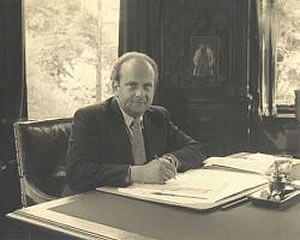
Louis de Bourbon (27 december 1908 – 8 januari 1975)
De Amerikaanse schrijver Louis Bromfield werd geboren op 27. Dezember 1896 in Mansfield, Ohio. Zie ook mijn blog van 27 december 2009.
Uit: Return to Pleasant Valley
„In the first weeks after I came home I never thought about my father’s friend, old Walter Oakes. Indeed I had very nearly forgotten his existence. And then one day I heard Wayne, one of the boys on the farm, say something about My Ninety Acres, and I remembered it all and asked, “is Walter Oakes still alive?”
“Alive!” said Wayne, “I’ll say he’s alive. The liveliest old man in the county. You ought to see that place. Brother, that’s the kind of farm I’d like to own. He raises as much on it as most fellows raise on five times that much land.”
Wayne, of course, was only 20. He couldn’t know how once people had laughed when Walter Oakes spoke proudly of My Ninety Acres. Clearly they didn’t laugh any more. Clearly Walter Oakes was the best farmer in all the county, very likely the best farmer in all the rich Ohio country.
The next Sunday I walked over the hills to My Ninety Acres. As I came down the long hill above the farm I saw it hadn’t changed much. The house still looked well painted and neat with its white walls and green shutters, and the barn was a bright, new, prosperous red.
As I walked down the hill I thought, “This is the most beautiful farm in America—the most beautiful, rich farm in the world—My Ninety Acres.”
The corn stood waist high and vigorous and green, the oats thick and strong, the wheat already turning a golden yellow. In the meadow the bumblebees were working on clover that rose almost as high as a man’s thighs.
I pushed open the little gate and walked into the dooryard with the neatly mown grass bordered by lilacs and peonies and day lilies … I remembered enough to know I should find old Walter somewhere in the fields. Sunday afternoon he always spent walking over the place. As a small boy I had followed him and my father many times.“
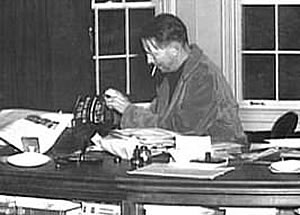
Louis Bromfield (27 december 1896 – 18 maart 1956)
De Amerikaanse schrijver en essayist Wilfrid Sheed werd geboren op 27 december 1930 in Londen. Zie ook mijn blog van 27 december 2009.
Uit: The House That George Built
„The huge, nonnegotiable gap between then and now is that in the past, music and dancing had always been disciplined by something or other. There had always been rules for doing it right, and even the wildest flights of swing and swing dancing had rested on a bed of piano lessons and dance lessons, and dress codes as well. Cab Calloway in a zoot suit was still a dressy man, a dandy; Cab Calloway in jeans or shorts over his knees would not have been dressed at all in the old sense. Going out dancing used to be an event, like going to church. Today all that remains are the rituals of prom night, which must seem weirder every year.
The era might also be measured in demographics or political cycles or even weather patterns. But the brilliant strand of music that, running through Irving Berlin and George Gershwin, has become the music of the standards began with a bang-with pianos being hoisted into tenements, a magnificent and noisy event, and it ended with guitars being schlepped quietly, almost parenthetically, into ranch houses and split-levels to herald the arrival of the great non-event that has been with us ever since.
But first the bang, then the whimper. There was no way of receiving such an impressive object as a piano quietly in such close quarters. Whether it bounced up the staircase or jangled its way over the fire escape and in through the window, the neighbors knew about it all right, and would be reminded again every time Junior hit the keys and shook the building. Short of a Rolls-Royce or carriage and horses, there was never such a status symbol, with the consequence that although “all the families around us were poor,” said Harry Ruby, “they all had pianos.” For such important matters, time-payments were born.“
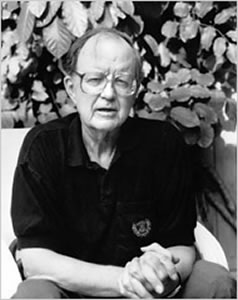
Wilfrid Sheed (Londen, 27 december 1930)
De Oostenrijkse schrijver en essayist Klaus Hoffer werd geboren op 27 december 1942 in Graz. Zie ook mijn blog van 27 december 2009.
Uit: Bei den Bieresch
„Den Sommer verbrachte ich in einer der unwegsamen Provinzen im Osten des Reiches bei einer älteren, nun alleinstehenden Verwandten. – Die Tage in diesem flachen, wie niedergebrannten Landstrich schienen kurz, flüchtig, kaum erinnerlich zu Beginn der trocken-kalten Nächte, in denen die Haut der Sterbenden wie Töpferglasur zerspringt.
Die täglichen Verrichtungen, die ich nach kurzer Zeit schon wie träumend besorgte, beschäftigten meine Aufmerksamkeit nicht, nur die rechte Hand, während die linke, häufig fest zur Faust geschlossen, wie ein Stein im Sack meiner Uniformhose ruhte. Es war die Hose meines Onkels, des Bruders meines Vaters und meiner neuen Quartiergeberin, der kurz zuvor als Postbeamter im Dienst einem Gehirnschlag erlegen war.
Ein Brauch der barbarischen Bevölkerung dieses öden, von den Errungenschaften der Zivilisation nur im negativen berührten Gebietes hieß den ältesten, am nächsten stehenden männlichen Angehörigen für die Dauer eines Jahres in die Kleider des Verstorbenen schlüpfen. Dieses Los hatte ich gezogen. Onkel und Tante waren unverheiratet und kinderlos geblieben; ich war das drittgeborene von vier Kindern, aber das einzige aus meiner Mutter zweiter Ehe. Mein Vater war noch vor meiner Geburt im Krieg gefallen.
So sollte ich nun in dem viel zu weiten, um Brust und Beine flatternden Gewand, das um den Bauch von einer Schnur zusammengehalten wurde, wie man sie für das Zusammenbinden von Postsäcken verwendet, das plötzlich verlöschte Leben des Onkels weiterführen, sei es, weil der Erfinder dieser menschenunwürdigen Einrichtung damit versprochen hatte, die feindlichen Geister zu bannen, sei es, daß er selbst geglaubt hatte, die Seelen der Verstorbenen würden eher Ruhe finden, wenn sie dann und wann in der ersten, schweren Zeit nach dem Tod ihre alte Umgebung heimsuchten und alles Rechtens vorfanden.“
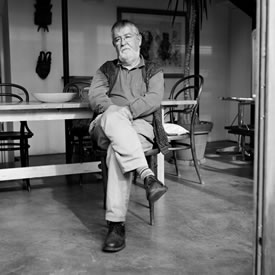
Klaus Hoffer (Graz, 27 december 1942)
De Amerikaanse schrijver en optredend artiest Bob Flanagan werd geboren op 26 december 1952 in New York. Zie ook mijn blog van 27 december 2009.
Uit: Pain Journal
„Depressed. In the hospital. Taking big red Wellbutrin pills but still depressed. Mom and Dad’s 45th anniversary-I made the call-no I didn’t-they called me cause I’m the sick one in the hospital. Their sick child. Their dying boy. When my mother calls and tells me I sound like I’m getting better I tell her no, not really, not yet. I’m almost rude to her about it. No, I’m not. I’m not better. I’m not ready to be better, so stop making me better already. And of course I spend the whole day feeling guilty about cutting her off because she was feeling so good that I might be feeling better, but I’ll make it up to her-tomorrow I will be better, even though I just now spit up a big wad of blood-I’ll still be better, just you wait and see.
*
Again by the dim light of the television, dim Bob whines as Sheree snores, but I can’t hear the TV cause I don’t want to hear Sheree, so I’ve got ear plugs in, which is frustrating because I’d like to hear bald Dennis Hopper talking to Tom Snyder, but I can’t stand the sound of Sheree’s snoring-I mean I really can’t stand it. It unnerves me. I’m the worst snorer in the world, but she doesn’t know it cause she’s out and I’m up-always up. A nervous wreck. Anti-depressants. Anti-anxiety. Vicodin. Steroids. Feel like crying all the time. I don’t want to go on this trip to Boston and Berlin. Gave every last ounce of energy to “Visiting Hours” in New York. Can’t give any more. But I’m doing it. I’m hating it, and I’m doing it. I took the ear plugs out-one earplug so I could hear the TV with one ear, but all I can hear is Sheree-I love her, I want to be with her, but that sound! Argh! It makes me want to scream.“
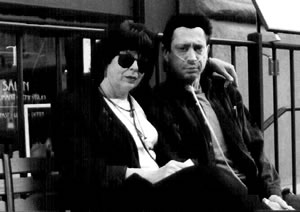
Bob Flanagan (27 december 1952 – 4 januari 1996)
Hier met zijn partner Sheree Rose in 1994
